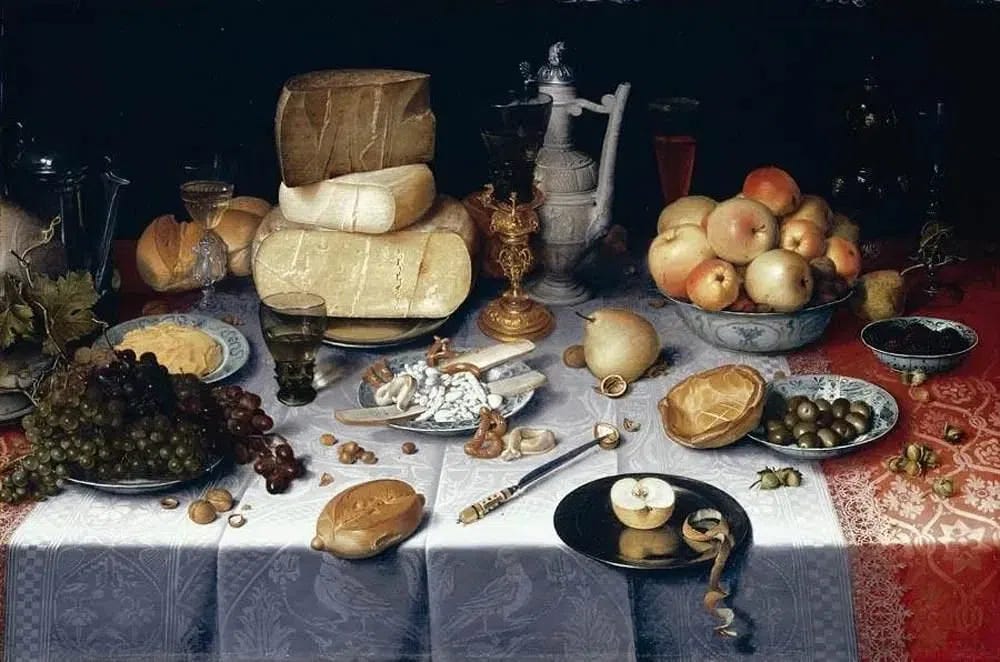I’ve been on a health kick this fall. I like to think that I’m usually pretty healthy—and I suppose I am by mainstream standards—but I had noticed a lax in care over the summer and was determined to reestablish my fence around my practices of true self-care: better sleep, regular movement, nourished eating, and so forth.
It’s been a good few months of this endeavor …but enter Thanksgiving. Now, I’m not implying this food-based holiday was a gorge fest around these parts, but let’s just say after having almost no sugar in my diet for three months, it was a shock to my system to savor a slice of cheesecake ….and then another. And then another. Over the holiday weekend, I had relaxed my habits in the name of celebration, and while it started out delightful, by the following week, I was craving once again my greens and my moderate self-discipline.
I was surprised at how hard it was to return to my habits.
I’ve long known that I’m the type of person who needs to abstain from a potential vice for a while until I master my appetite for the thing. I stopped drinking soda almost twenty years ago so I can be around the stuff and not care one bit. I genuinely don’t want it. But baked goods, a fun cocktail, or chips and queso? That’s another story. Boundaries help me with these things, and they start with a tight fence around a small space in which I allow myself to move. It’s easier for me, at first, to have no pumpkin bread in the house at all than to bake a loaf and enjoy only one slice.
The key to our ability to ultimately do just that—to enjoy something in moderation—is the virtue of temperance, quite possibly the most misunderstood of all the virtues. And it’s this oft-unsung gem that I want to explore here in our next installment of the four cardinal virtues.
This is part of a series. Head here to read the first installment on prudence.
It’s not at all a random coincidence that my focus is on temperance this time of year. If there’s ever a virtue we would do well to tap into during Advent, it’s temperance.
What is Temperance?
As a reminder, temperance is one of the Four Cardinal Virtues, a system initially developed mostly through Aristotle, then the first-century Stoics, and eventually in Christian theology and philosophy through thinkers like St. Ambrose, St. Augustine, St. Jerome, and especially St. Thomas Aquinas.
Cardinal comes from the Latin word “cardo,” meaning hinge, so in this context we mean that these four are the most essential virtues, the virtues upon which all other virtues turn (like a door hinge).1
Virtue is “a habitual and firm disposition to do the good”2 and helps us habitually do what is good because they are the building blocks for morality. St. Augustine says it beautifully: virtues are “rightly-ordered loves.”3
The Four Cardinal Virtues are “the habit of having righty-ordered loves so as to build a foundation for our entire morality,” and the pursuit of them is lifelong for each of us.
In the last installment of this series, we unpacked prudence. Now, let’s focus on temperance. Here’s the definition, as a reminder:
Temperance: Moderation in pleasures and the balanced use of created goods.4
Unfortunately, many of us hear the word “temperance” and immediately think of the Temperance Movement from the late 19th and early 20th centuries. Sadly, it was probably misnamed, having been more associated with the idea of abstinence. To this day, our twenty-first-century ears hear temperance and immediately assume abstinence.
In some ways, that’s not a bad thing—as in my Thanksgiving example, earlier, sometimes we need to completely shun a vice to protect our bodies and souls from our inordinate desire for it. But it only works for a time, and in using the tool of abstinence (in this regard), we’re depriving ourselves of the opportunity to cultivate a cardinal virtue.
If temperance is indeed cardinal, then we should want as much of it as possible. A lifelong cultivation of the cardinal virtues is the definition of a good life, after all.
Honestly, out of all four cardinal virtues, I sense that temperance is the one we need least convincing of our need for it, yet it’s also the one we most want to scowl at. At face value, Temperance feels like the Debbie Downer at the party, the smart-but-boring friend who reminds you that you probably shouldn’t eat that second brownie. However, temperance might be better thought of as the wise-yet-merry aunt who loves us and wants the absolute best for us, even when it means a short-term loss for a long-term gain. She’s the one you want to sit next to at the family gathering.
Needed Reminders
Here are a few things we moderns should keep in mind regarding temperance:
• Pleasures aren’t bad. In fact, the entire need for the virtue of temperance is because rightly-ordered pleasures are good! It’s that “rightly-ordered” that matters, and what’s also impossible to do without habit formation.
• Moderation means downplaying abstinence for our higher good: true mastery over our base nature. We want mastery because it’s in line with how we’re actually made to be. After all, all good things are from God. We should want God’s gifts in the right way.
• Temperance means enjoying good things at the right time, in the right place, and in the right way. And like all the virtues, it doesn’t exist to punish us or throw water on the fire. It’s there because it’s good for us. We want temperance because of the goodness of true pleasure.
Practical Tips
• It might be wise to begin with abstinence. Don’t bring a good pleasure into your life at all right now—again, not because the pleasure is bad, but because you want to rightly order your loves. Don’t depend on total deprivation long-term (barring some exceptions, of course) because that deprives us of a cardinal virtue, but used well, abstinence could be an on-ramp to that road of rightly re-ordering our loves.
• Create a temporary boundary. Advent is a great example of a short-term, purposeful fence that helps you stay where you need to be for a season. Remember, the posture of Advent is preparatory and penitential, in sharp juxtaposition to the culture around us that sees this time of year as Christmas. As I’ve said, don’t be an outward purist, but use this short season of fasting to intentionally practice a form of denial for the greater good: cultivating temperance. (Remember, fasting is always followed by feasting in the liturgical calendar: you’ll have twelve days to celebrate soon enough during Christmastide!)
• Embrace discomfort. We moderns are so quick to do anything and everything to rid ourselves of the terrible feeling of being uncomfortable, mostly because we’re simply not used to it. For most of human history, people have had seasons of deprivation out of necessity. In our era, we have most of our felt needs met instantly, which means we’re sorely out of practice with the human condition called hardship. When the unpleasant feeling comes—a sugar craving, a veering towards the pantry out of habit, a desire to do anything but get out of the chair and put on workout clothes, the pain of getting out of a warm bed, the sadness of not having an unessential item in your shopping cart—be honest and call it what it is: suffering. Pretending this isn’t true often backfires into eventual unmitigated indulgence. Recognize that it is indeed painful to experience this, and that a truly good life calls us to suffer.
During Advent, we’re at least gifted with a “festive discomfort” — by nature of a season focused on anticipation, we naturally feel the discomfort, whether we’re a child giddy with the idea of Christmas coming but not yet here, an adult dreading the expectations rife in this season, or simply as someone who knows deeply they don’t yet measure up to their ideals and is therefore in desperate need of the cardinal virtue of temperance.
As for me, I’m embracing the gift of Advent as the time I need to re-establish my pre-Thanksgiving boundaries and focus on intentional deprivation for my greater good. Those cookies and cocktails will be mighty sweet in a few weeks, and they should be enjoyed in moderation. There’s a reason we’re called to feast. We’re all called to the ultimate True Feast, and we want to be ready for it.
I’d love to hear from you: How do you plan to embrace festive discomfort this Advent season? Do share here in the comments.
Ora et Labora,
Tsh
https://shorturl.at/dkrLZ
https://shorturl.at/GJKPY
City of God, XV.22
https://shorturl.at/aoKQS





Oh, I loved this. Mansfield Park is probably my favourite Austen novel and the main lady, Fanny Price, is the picture of temperance. Unsurprisingly, people usually rag on her as being the most boring of Austen's ladies.
As for Advent...as we've moved into the Orthodox Church, I've really learned to appreciate the fasting-before-feasting liturgical cycle. I almost never think I'm teetering towards gluttony until a fast reveals to me that, yes, yes I am. I love to hide in creaturely comforts and numb the prompting of the Holy Spirit. I always come out of a fast which such awareness and gratitude for the many good gifts around me!
I think it's interesting the Church historic maintained such regular fasts throughout the whole year like they knew we needed the habit of temperance...
Well said, Tsh!
We have a long standing tradition to give up sweets during Advent. It has always served as a reminder of the season! This year I'm also (painfully) getting up earlier (for no other reason except to sit in the silence).
And perhaps not a festive discomfort, but our family commits to finishing Christmas shopping before advent...I know that might make me sound crazy... but it has given Advent so much more space in my mind and heart.